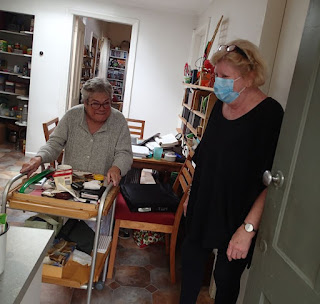 |
Finished! Octahedron with large Holey Dollar (side) and small Dump (truncation) construction. 8 Holey Dollar sides and dump truncations. 3d printed hinges surround each face, and geometry is determined by the truncation diagram and table shown in an earlier post.
|
 |
Octahedron with cd sides and nexorade knitting of vertices as support, see here
|
 |
Octahedron with cd sides and bicycle cog truncations, see here
|
 |
A glued pin from bicycle spokes and spoke nipples are the edges / hinge pins. Here, some cut up spokes are ready for processing
|
 |
Spokes with spoke nipple in place and cropped for length. Nipples are superglued to the spokes.
|
 |
Holesaw set, trial Holey Dollar and Dump.
|
 |
Measuring parts and dollar blanks. The disc od's are used in hinge designs.
|
 |
Drilling the dollars
|
 |
Cube made from dumps.
|
 |
Ready to assemble. Half hinges are held to sides by hair elastics (strong rubber bands)
|
 |
Halfway through
|
 |
| Done! |
Hi
For a while I've been making platonic solid shapes using circles as sides. After a while, I realised that 2 of the solids - octahedron and icosahedron - are hard to make using this method because the sides don't join together in reinforcing triangular 3d groups. For these solids, some reinforcing is needed, and truncation works well. Here are some octahedrons I made before: one here with bike cogs as truncations, and this one with knitted corners.
Since making those constructions, I've improved the edge pins by making them from threaded bicycle spokes, and they don't come out now!
So this post shows the latest version. A few days ago I worked out that the octahedron truncation circles could come from the face circles, it just needed a bit of calculation to work out whether the sizes I could make with my holesaws would work. And I found a suitable size, did the 3d cad and printing required, and a few days later, voila it all works. The construction reminds me of the Holey Dollar and Dump, an early New South Wales coin set where a small coin is manufactured from the centre of a large one.
The same construction pattern could be used for a truncated icosahedron - a version of this one - but that is quite a bit bigger.
For now I want to make an octahedron with dump sides made by drilling the main sides off-centre. This will make the truncation sides have 2 holes, making clues as to the origin of the truncation sides. I can just make and varnish the sides, and use the pins, hinges and hair elastics shown above. Otherwise I can make the whole thing which involves being a slave to the 3d printer for about 24 hours. At the moment I'm inclined to make it from scratch.
Regards
Steve Nurse
Regards
Steve Nurse













































